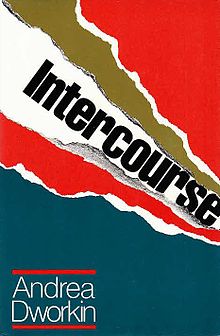Intercourse (book)

Cover of the first edition
|
|
| Author | Andrea Dworkin |
|---|---|
| Country | United States |
| Language | English |
| Subject | Sexual intercourse |
| Publisher | Free Press |
|
Publication date
|
1987 |
| Media type | Print (hardcover and paperback) |
| Pages | 257 |
| ISBN | |
| OCLC | 37625851 |
| 306.7 | |
| LC Class | HQ |
Intercourse is a 1987 book by Andrea Dworkin, in which Dworkin offers a radical feminist analysis of sexual intercourse in literature and society. Dworkin is often said to argue that "all heterosexual sex is rape", based on the line from the book that says "violation is a synonym for intercourse." However, Dworkin has denied this interpretation, stating, "What I think is that sex must not put women in a subordinate position. It must be reciprocal and not an act of aggression from a man looking only to satisfy himself. That's my point."
In Intercourse, Dworkin extended her earlier analysis of pornography to a discussion of heterosexual intercourse itself. In works such as Woman Hating and Pornography: Men Possessing Women, Dworkin had argued that pornography and erotic literature in patriarchal societies consistently eroticized women's sexual subordination to men, and often overt acts of exploitation or violence. In Intercourse, she went on to argue that that sort of sexual subordination was central to men's and women's experiences of sexual intercourse in a male supremacist society, and reinforced throughout mainstream culture, including not only pornography but also in classic works of male-centric literature.
Extensively discussing works such as The Kreutzer Sonata, Madame Bovary, and Dracula (and citing from religious texts, legal commentary, and pornography), Dworkin argued that the depictions of intercourse in mainstream art and culture consistently emphasized heterosexual intercourse as the only or the most genuine form of "real" sex; that they portrayed intercourse in violent or invasive terms; that they portrayed the violence or invasiveness as central to its eroticism; and that they often united it with male contempt for, revulsion towards, or even murder of, the "carnal" woman. She argued that this kind of depiction enforced a male-centric and coercive view of sexuality, and that, when the cultural attitudes combine with the material conditions of women's lives in a sexist society, the experience of heterosexual intercourse itself becomes a central part of men's subordination of women, experienced as a form of "occupation" that is nevertheless expected to be pleasurable for women and to define their very status as women. Dworkin describes the view of intercourse enforced by saying:
...
Wikipedia
